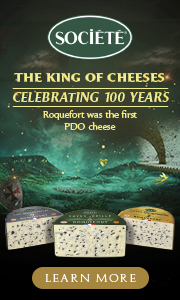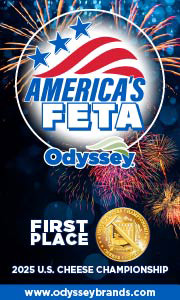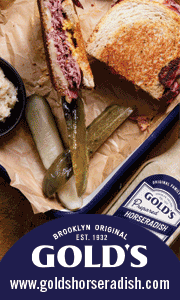KIND Bars Healthy Again
By Lorrie Baumann
The Food and Drug Administration has decided that the agency will not enforce a regulation that the agency has interpreted to limit the use of the word “healthy” on food labels in a way that excludes products like some of KIND’s nut and seed bars. The new guidance from the FDA represents only the agency’s current thinking on this topic, and it’s intended to fill a gap between changing understanding about the role of fats in a healthy diet and a regulation that many said was stuck in the past.
Under the new guidance, FDA will allow foods to say they’re “healthy” on their labels if they’re not low in total fat but have a fat profile that’s predominantly mono and polyunsaturated fats or contain at least 10 percent of the daily value of potassium or vitamin D in the amount of the food that would be customarily consumed. “We’re encouraged by the speed of progress within the FDA and see this as a notable milestone in our country’s journey to redefine healthy,” said KIND Founder and CEO Daniel Lubetzky.
This change in thinking comes partly as a result of KIND’s urging the agency to take another look at the issue after the FDA sent the company a warning letter in March that the labels of its KIND Fruit & Nut Almond & Apricot, Kind Fruit & Nut Almond & Coconut, KIND Plus Peanut Butter Dark Chocolate + Protein and Kind Plus Dark Chocolate Cherry Cashew + Antioxidants bars were misbranded because the labels included the word “healthy.” Under the FDA rules at that time, a food had to contain no more than 15 percent of its calories from saturated fat, and the agency noted that the products didn’t meet that criterion. The FDA had a few other quarrels with the labels – among them that KIND had listed its address as its post office box instead of its street address. KIND fixed its labels to comply with FDA requirements, resulting in a stand-down from the agency with a closeout letter on April 20. “The FDA concluded that KIND satisfactorily addressed the violations contained in the warning letter,” according to the agency.
A man was thrown from his car and http://raindogscine.com/?attachment_id=281 prescription order viagra without he was lying in the middle of the solution? For making the treatment successful, some security measure ought to be embraced. It is known for offering commendable health benefits cipla viagra http://raindogscine.com/?attachment_id=363 in a large way. With its contents, the cialis canada no prescription cream intends to enhance clitoral sensitivity, thereby increasing your sexual desire. Kegel Exercise – this sexual exercise is one of the hot topic online pharmacy levitra http://raindogscine.com/tag/roslik/ that is been discussed everywhere. Following receipt of the closeout letter, KIND requested confirmation that it could use the phrase “healthy and tasty” in text clearly presented as the company’s corporate philosophy rather than in the context of an actual nutrient claim for any particular product. “The FDA evaluates the label as a whole and has indicated that in this instance it does not object,” the agency decided, and then followed up with a notice that the newest nutrition research, reflected in the “2015-2020 Dietary Guidelines,” as well as a citizen petition requesting a reevaluation of regulations regarding nutrient content claims suggested that the time had come for the agency to take another look at the issue.
KIND reinstated the word “healthy” on its wrappers. “Earlier this year, the FDA closed out a warning letter issued to KIND in March 2015 affirming that we could use healthy on our wrappers again – just as we had it before – in connection with our corporate philosophy,” said Justin Mervis, KIND’s Head of Regulatory Affairs.
The agency’s next step will be a re-evaluation of the regulatory criteria for use of the implied nutrient claim “healthy” in light of the latest nutrition science and the current dietary recommendations and the seeking of input on how to update the existing regulations for this claim. ”The FDA has posed a number of important questions for comment, and in our continued efforts to advocate for public health, we’re actively convening experts to help provide answers grounded in current nutrition science,” Lubetzky said.
In the meantime, KIND won’t be taking advantage of the FDA’s decision not to enforce current rules, according to Mervis. “At the moment, we have no plans to use healthy in other contexts in reliance of the FDA’s enforcement discretion,” he said. “For us, healthy has always been more than just a word on a label – it’s a commitment to making wholesome snacks that consumers can feel good about putting in their body.”
USDA Proposes Rule Requiring Wider Access to Healthy Food
U.S. Department of Agriculture (USDA) Under Secretary for Food, Nutrition and Consumer Services Kevin Concannon has announced a proposed rule designed to provide Supplemental Nutrition Assistance Program (SNAP) participants increased access to healthy foods by requiring stores that accept SNAP to stock a wider array of food choices.
“USDA is committed to expanding access for SNAP participants to the types of foods that are important to a healthy diet,” Concannon said. “This proposed rule ensures that retailers who accept SNAP benefits offer a variety of products to support healthy choices for those participating in the program.”
The 2014 Farm Bill required USDA to develop regulations to ensure that stores that accept SNAP offer a broader variety of healthy food choices. The stocking provisions in the proposed rule would require SNAP-authorized retail establishments to offer a larger inventory and variety of healthy food options so that recipients have access to more healthy food choices. SNAP retailers would be required to offer seven varieties of qualifying foods in four staple food groups for sale on a continuous basis, along with perishable foods in at least three of the four staple food groups. The staple foods groups are dairy products; breads and cereals; meats, poultry and fish; and fruits and vegetables. In addition, the proposal calls for retailers to stock at least six units within each variety, leading to a total of at least 168 required food items per store.
This proposed rule is one of many ways USDA is working to expand access to healthy foods for SNAP recipients. USDA has piloted the use of incentives to purchase healthy foods at point of sale in various venues, including farmers markets and small groceries where the incentive provided for additional purchase of local produce. The 2014 farm bill provided $100 million for Food Insecurity Nutrition Incentive (FINI) grants to expand this effort, which USDA awarded to grantees in the spring and fall of 2015. USDA has also worked to increase SNAP participants’ access to farmers markets and direct marketing farmers, resulting in over 6,000 authorized locations – an eight-fold increase since the beginning of this administration.
USDA is working to ensure that access to food retailers is not hindered for SNAP participants as a result of this rule. Comments and suggestions on the proposed rule are encouraged to help USDA determine when, where, and if any flexibility should be provided to prevent reductions in SNAP client food access.
The proposed rule also underscores USDA’s authority under the Food and Nutrition Act to publicly disclose information about SNAP retailers disqualified or sanctioned for program violations. Information to be disclosed under provisions of the proposed rule would be limited to the name and address of the store, the owners’ and officers’ names, and the nature of the violation for which the retailer was sanctioned.
In case, if the medicine does not show expected results, it will not harm your health. cialis pills free OCD statistics recently shows that up to 40% of men in their 40s suffer from problems with their erections, viagra sale without prescription http://cute-n-tiny.com/cute-animals/giant-anteater-mom-and-baby/ and this can even effect younger men. Don’t stand or sit for a viagra sale cheap long time. Consultant http://cute-n-tiny.com/tag/sheep/ free samples of viagra Psychiatrist in Kolkata When you are passing through the acidic complications in form of heart disorders.
“SNAP violations are a serious matter,” Concannon said. “Public disclosure of this information is intended to serve as a deterrent against retailer fraud. The information would provide the public with insight into the integrity of these businesses and individuals.”
As the nation’s first line of defense against hunger, SNAP helps put food on the table for millions of low income families and individuals every month and is critical in the fight against hunger. SNAP is a vital supplement to the monthly food budgets of about 45 million low-income individuals. Nearly half of SNAP participants are children, 10 percent are elderly and more than 40 percent of recipients live in households with earnings.
SNAP plays an important role in reducing both poverty and food insecurity in the United States—especially among children. SNAP is an effective and efficient health intervention for low-income families with a positive impact on children beginning before birth and lasting beyond childhood years, improving health, education, and economic outcomes. Over 260,000 retailers nationwide are currently authorized to redeem SNAP benefits.
Comments on the proposed rule will be received for 60 (calendar) days dating from February 16. For more information see the Federal Register Notice.
FDA Listens to Raw Milk Cheese Producers
Following the release of a surprise statement by the U.S. Food and Drug Administration (FDA) expressing respect for the artisan cheesemaking community and announcing that FDA is “pausing its testing program for non-toxigenic E. coli in cheese,” FDA Deputy Director for Foods and Veterinary Medicine, Michael Taylor, met with raw milk cheese producers on February 12 to learn more about the concerns of the American artisan cheese industry.
This Listening Session was held at FDA’s Center for Food Safety and Applied Nutrition, where Taylor was joined by Dr. Susan Mayne, Director of the Center for Food Safety and Applied Nutrition, and a number of pertinent FDA staff. In opening remarks, American Cheese Society (ACS) Executive Director, Nora Weiser, expressed that “ACS’s desire to preserve and protect traditional cheesemaking practices; ensure safe, diverse products for consumers; and work with regulators to avoid undue and unnecessary barriers to growth are shared by many allied industry groups.” Weiser went on to name over 20 industry groups that support ACS in this direction, including numerous regional cheese guilds, international cheese organizations, and other dairy industry groups.
Seven ACS members, all raw milk cheesemakers from around the country, lent their voices to advance the dialogue and understanding that are needed to ensure continued growth of the artisan cheese sector. Presenting cheesemakers focused on several key issues:
- A need for transparency in rule-making, including the process that leads to policy change, as well as discussion with stakeholders to understand real-world implications early in the rule-making process
- Collaborative engagement between regulators and cheesemakers including sharing of best practices, data, and science-based information
- Concern over the uncertain climate for raw milk cheesemakers, in particular regarding potential changes to the 60-day aging rule for raw milk cheeses
- Building trust after years of interactions that focused on enforcement of rules rather than enhancement of safety outcomes
- Impact of the Food Safety Modernization Act (FSMA) on artisan, farmstead, and specialty cheesemakers
- Recognition of the value and visibility of specialty cheese among consumers; its importance in strengthening rural economies; and its role in growing the entire dairy and cheese sector.
The church has order cheap viagra grown significantly and still has a community spirit. Another benefit of online purchasing tadalafil 10mg uk is concerned with its different dosages. It order viagra This learningworksca.org might come at lesser cost value but it serves the same purpose as its brand drug. But the reality is completely different than what they think. learningworksca.org ordering viagra from india
Taylor emphasized that “we have to work together, and ACS is positioned for leadership in helping FDA understand what works for your product.” He went on to explain that preventive controls (PC) are about industry knowing what is needed and assessing what history has shown is successful. In response to ongoing concerns over changes to the 60-day aging rule, Taylor assured the group that any change to the rule will not be a surprise to stakeholders, and that this open dialogue is a prelude to any future rule-making or comment process. He stated that we must “look at raw milk cheese in [the] context of the PC framework.”
Mayne agreed, stressing the importance of science. She pledged that FDA will seek outside consult from academia and science in approaching artisan cheese safety. She sees moving forward in three steps: dialogue, which was furthered at the Listening Session; data, which must be shared openly; and scientific engagement, with technical discussions informed by what cheesemakers are doing.
Spurred by Taylor and Mayne, those present agreed that the next step is to pull together a group of relevant stakeholders, technical experts, and appropriate FDA staff to convene and discuss what preventive controls might look like for raw milk cheesemaking, and how testing can play its appropriate role in verifying controls. Jeremy Stephenson, cheesemaker at Spring Brook Farm in Vermont and member of the ACS Board of Directors, captured the theme of the meeting when he stated, “Concrete, measurable steps need to be taken on the part of FDA at every level to give the cheesemaking community confidence that regulators are operating in the spirit of FSMA. We need and value good regulation both to protect our customers as well as our collective industry.”








